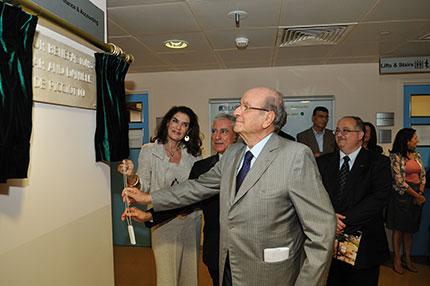Banking on Goodwill
Financial behemoth Edgar de Picciotto and his wife Daniele were at LAU in early October to formally announce an endowed scholarship and deliver a lecture on the global economy.
Known fondly as one of “the cleverest bankers in Geneva”, de Picciotto founded Union Bancaire Privée (UBP) in 1969 and is credited with pioneering hedge funds. With over $77 billion in assets under its management, UBP ranks as the best-capitalized family-owned bank in Switzerland.
The de Picciottos recently established a $500,000 Scholarship Endowment Fund to assist deserving and needy LAU students majoring in banking, finance and accounting. In recognition of their generosity, LAU President Joseph G. Jabbra unveiled a commemorative plaque at the Finance and Accounting Department in the School of Business, dedicated “To Our Benefactors Edgar and Daniele de Picciotto”.
In thanking the generous donors, Jabbra described Edgar as a “visionary with a knack for thinking outside the box.” He lauded the couple’s commitment to educating future financial leaders, noting they had founded the de Picciotto Chair in Alternative Investment at the renowned INSEAD business school. Earlier this year, the de Picciottos also sponsored a student accommodation building at the Graduate Institute of International and Development Studies in Geneva.
The ceremony was followed by a lecture by de Picciotto to LAU Banking and Finance, MBA & EMBA students, entitled “My Personal Journey in Banking and My Vision on the Future of the World Economy”.
De Picciotto, who was born in Lebanon into an Italian merchant family that had been trading in the Arab world for three centuries, said his visit to LAU was one of “great emotion”. He left Lebanon for Europe aged 18 to study chemistry and mechanical engineering, but soon realized his passion lay in finance.
“Banking immediately excites the imagination and fills the mind with the thought of money. But banking is not about money,” he remarked, insisting that an intimate understanding of client needs and economic vision were vital to real success.
The banker painted a bleak picture of the global economic situation, warning the audience to expect recession only to get worse before it can improve. “Although the problem is now so huge, our leaders have not yet realized that debt is like a terminal cancer, it cannot be solved,” he told the audience.
Today’s age of austerity was a direct ramification of a 1971 decision made by U.S. President Nixon to unilaterally cancel the direct convertibility of the U.S. dollar to gold, effectively ending the Breton Woods International Monetary System, said de Picciotto. Nixon’s move led to “the take-off of the biggest credit binge in history.”
De Picciotto opined that anger at banker bonuses was misplaced. “The biggest culprits are the central banks – they are the ones who let things get out of hand because they didn’t understand what was happening,” he said.
The lecture was followed by a reception where de Picciotto continued to answer questions from LAU students and faculty.

